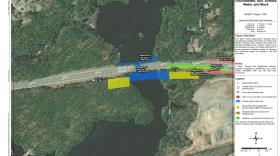The PFAS-REACH study is looking to test whether exposure to PFAS — a group of man-made chemicals that have been linked to harmful health effects — changes how children’s immune systems respond to vaccines.
Researchers were originally looking for children between 4 and 8 to participate in the study, but they have now expanded to include children from 11 to 15.
Kids who attended daycare at Pease before 2014, or whose mothers worked there, are eligible.
Laurel Schaider, a senior scientist at the Silent Spring Institute who is leading the study, says the research could provide scientific insights about how PFAS chemicals work in the human body. But parents and their children can benefit, too.
“For people who take part in the study, they can learn about the levels of PFAS in their child's blood," she said. "And that can give them some sense, potentially, of the level of exposure their child may have experienced."
Previous research has shown that children who have had high levels of PFAS exposure have had reduced levels of antibody production – the proteins that help fight infections. This study is looking in particular at whether that’s happening with children who were exposed to PFAS through drinking water with chemicals that came from firefighting foams.
The age groups represent the timing of diphtheria, tetanus and pertussis vaccinations. Researchers are looking for children to participate after one of the doses of that vaccine given at age 4 or 5, and after another dose, usually given when they’re 11 or 12.
Researchers added the older age group to help boost enrollment numbers and so more families could participate. Adding the older group means children who were exposed themselves – not just through their mothers – will be able to participate.
“It means people like my children can participate in the study, and we can help contribute to the science on PFAS,” said Andrea Amico, who started an advocacy group called Testing for Pease to advocate for families like hers, who were exposed to contamination.
Amico says it’s exciting to have the opportunity to help build the knowledge base around PFAS exposure, and possibly help other communities that have been exposed.
“We have had the unfortunate experience of being exposed to highly contaminated drinking water, and we don't have a lot of answers about how that's going to affect our health,” she said. “We can't undo what's been done in the past, but we can try to make the best of the future moving forward.”
Researchers hope to have 60 children exposed at Pease participate, and another 60 children exposed at another site in Hyannis, Mass.
Participants will meet with the research team to go through the consent form, talk through their questions, and then set up an appointment to collect blood and urine samples, which can be done during a home visit. Results of the antibody tests come back after a week or two, and families will also get back children’s blood tests. Families that complete all parts of the study also get $125 in gift cards.
For more information, families can reach out to pfas-reach@silentspring.org, or call or text 617-221-6428.








